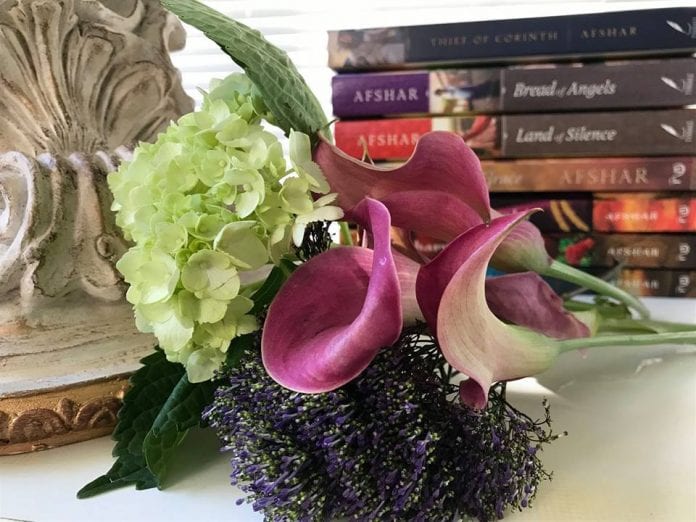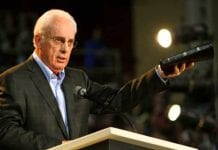by Tessa Afshar
Tessa Afshar was voted “New Author of the Year” by the FamilyFiction- sponsored Readers Choice Awards in 2011 for her novel Pearl in the Sand. Her second book, Harvest of Rubies, was nominated for the 2013 ECPA Christian Book Award in the fiction category and chosen by World magazine as one of four notable books of the year. Hernovel Harvest of Gold won the 2014 Christy Award for historical fiction. In the Field of Grace, based on the biblical story of Ruth, was nominated for the Grace Award.
Tessa was born in Iran to a nominally Muslim family and lived there for the first fourteen years of her life. She moved to England, where she survived boarding school for girls and fell in love with Jane Austen and Charlotte Bronte, before moving to the United States permanently. Her conversion to Christianity in her twenties changed the course of her life forever. Tessa holds an MDiv from Yale University, where she served as cochair of the Evangelical Fellowship at the Divinity School. Tessa has spent the last seventeen years in full-time Christian work in New England and the last fourteen years on the staff of one of the oldest churches in America.
Q. Land of Silence is based on the biblical story of the woman with the issue of blood. Did you learn anything as you researched this novel?
A. I have always known that there are no throwaway phrases with Jesus. He is very intentional with every word he chooses. Interestingly, the woman with the issue of blood is the only person that Jesus addresses directly as daughter. I was intrigued by this anomaly, and I based a large part of the story line on Jesus’s reason for addressing her in such a tender manner. Ultimately, I think he addresses all his followers in the same way. We too are daughters and sons. And when we grasp the depth of that claim, our internal lives are transformed.
Q. The heroine of the story, Elianna, tells her sister, “One step at a time, we can go forward, and learn to be faithful in suffering.” What did she mean by this?
A. We all suffer in this world. As hard as we may try to control our circumstances, suffering will find us and make its home with us for a season. It demands a response from us. Will we be angry? Will we despair? Will we reject God? Elianna’s response is to be faithful to God one step at a time. One painful hour at a time to trust him still and call him Father. I think that is the most effective response to suffering, and the one Jesus modeled for us.
Q. You write, “Despair is an invitation to prayer. You can either sink or pray when it lodges at your door.” What did you mean by those words?
A. There are seasons of life when we may land in despair. Even the apostle Paul admits to experiencing despair when he says, “We were under great pressure, far beyond our ability to endure, so that we despaired of life itself” (2 Corinthians 1:8). In such seasons, we have only two real options. We can either sink under the weight of despair or pray ourselves out of it. God has the power to destroy hopelessness and its repercussions. In his presence, we enter the power that binds despair.
Q. Why do you write biblical fiction?
A. The Bible is the greatest book ever written.Something about the stories it contains has managed to grab the human heart for thousands of years. More often than not, God chooses deeply flawed men and women through whom he fulfills his purposes. That’s why so many of us can relate to them! A broken woman who rises above her circumstances to make the right choice, to cling to God, and to ultimately overcome is an inescapably powerful character to read about. I relate to her brokenness and am inspired by her victory. In my experience, all of us struggle with various kinds of insecurities. We doubt ourselves. We even doubt God. But in God’s hands, these fissures that run through the very fabric of our being can turn into glory, because the light of his countenance can shine through them. This is why I like writing biblical fiction. That doesn’t mean I have stopped liking Jane Austen, Charlotte Bronte, or some contemporary YA fiction!
Q. Outside of the Bible, what resources do you use?
A. Historical and archaeological records, academic books, online sources, museums, photographs of ancient buildings, and even interviews with my Middle Eastern relatives about the weather, topography, and geography of a particular area they are personally familiar with.
Q. What is your idea of a favorite vacation?
A. To have one? If you want me to be more specific, then I would love to visit a sunny island nestled against a deep-blue ocean, with nothing to do but eat, read, swim, and walk on the beach with my wonderful husband. On the other hand, I would take a vacation in Italy. Or a tour of the churches mentioned in the book of Acts. Or a few weeks walking about Israel. As you see, I’m not picky.
Q. What would you tell an aspiring writer?
A. Persevere. Dream big. Hone your craft. Love the characters you choose. Be emotionally honest. Write because you love telling stories, not because you want to be recognized or admired or to make money. For me, writing is not a hobby. It’s not even a job. It is a call. I believe I was created to do this. The Bible says that God created us in Christ Jesus to do good works, which God prepared in advance for us (Ephesians 2:10). I believe, in my life, part of that work is writing. So what shall I say when things become hard or seem untenable? Shall I walk away from God’s purpose? Shall I ditch my destiny just because it’s hard? If writing is a call in your life, you must persevere.
Q. Why is perseverance so important to you?
A. Life can be a battlefield. Your job, your relationships, your heart, your destiny—they can all come under assault. Without perseverance, it’s easy to lose hope in the darkest hours. When you feel most overwhelmed, remember that the Lord has not forgotten you. He is on your side. He is for you, even when you feel you are unworthy of his care. Your worth does not depend on what you do or whether you fail. Your worth is in his love. His covenant of peace in Jesus will never be shaken. You are his, and he will not give you up.
Q. How did you become a Christian?
A. Although I have lived in the Christian West my whole adult life, I never heard the gospel until I was in my mid-twenties. During a particularly difficult season in my life, I had a vivid dream. In my dream I was on the shores of the Sea of Galilee. From a distance I saw a man walking toward me and I knew instantly that this was Jesus. As he drew closer, I felt very disappointed. You see, he was not handsome by any stretch of the imagination! The only Jesus I had seen up to this point was portrayed by a couple of very good-looking actors in TV movies. I thought, This is Jesus? As he approached, I realized, Of course this is Jesus, for in his eyes I saw such depth of love and power that I almost fell to my knees. He asked me to follow him and I did. In the dream not only did I know him as Jesus, but I also knew beyond the slightest shadow of doubt that he was the Son of God, very God of very God, and unlike anyone else in the whole universe. Shortly after that dream, friends began to ask me to go to church and Bible study. It was as though God himself first opened a door in my inmost being and then arranged for me to find out the facts! I simply fell in love with Jesus. There’s no one like him.
Q. Is it true that bees are mentioned in all your books? Is this intentional, and if so, why?
A. Yes! Bees or hornets are mentioned in different contexts in all my books. Sometimes it’s just an incidental comment, like this is a hornet’s nest. Sometimes, as in Land of Silence, the bee plays a pivotal role. I use bees as a sort of hidden signature. A way of saying I was here. Another unconventional tendency I have is to use a quote from a historical author not related to the Bible. From Oscar Wilde to George Bernard Shaw, you are liable to find the most unlikely people quoted in my novels. It’s just pure fun for me to play these little games within the story.
Q. Fans often comment about the depth of emotion in your novels: you make readers laugh and cry. They even say they feel your characters are like friends. Why do you think that is?
A. I don’t set out to make people laugh or cry. I set out to tell a story. Life is joy and sorrow all at once. I think it was Rick Warren who said life is like railroad tracks. You must learn to ride both sides of the track at the same time, coping with pain while rejoicing in the beautiful moments. My stories capture that reality.
Because my characters are formed somewhere inside me, they snag a little part of me on the way out. I don’t know how to write about perfect people. I try to capture authentic characters, men and women with genuine struggles who, in spite of mistakes and failures, manage to ultimately make the right choices. I think fans appreciate the honesty of the characters and their inner struggles. I suspect they also like the romance! I sure do.
Learn more about Tessa here: www.tessaafshar.com.
Get your copy of Land of Silence here: www.tyndale.com/p/land-of-silence

















